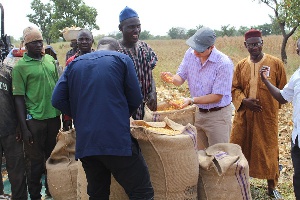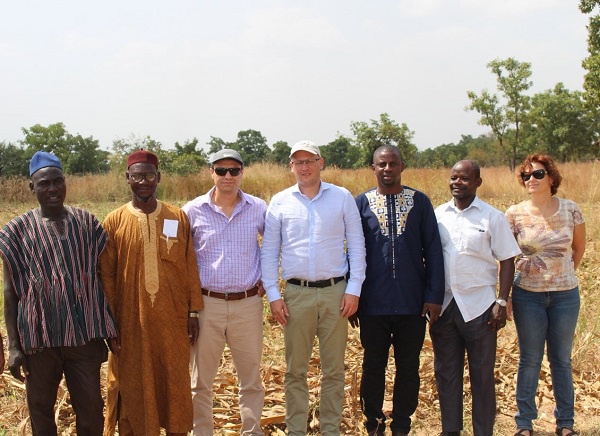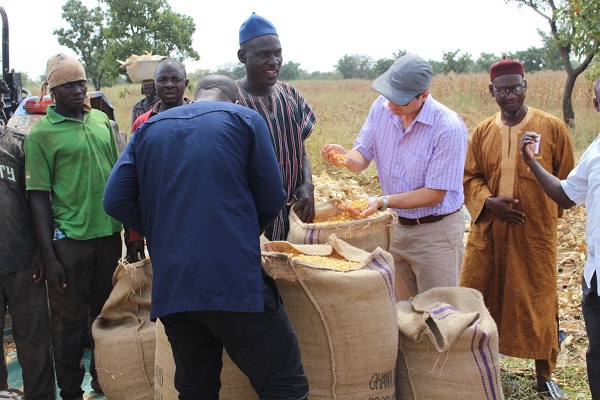 Officials from Nestle assisting the farmers with the cereal
Officials from Nestle assisting the farmers with the cereal
Nestlé has embarked on a project assessment visit with the USAID to Northern Ghana, where the company, in partnership with USAID, is supporting cereal farmers. This partnership forms part of Nestlé’s ambition to develop thriving, resilient communities along its value chain.
From farm to fork, safe and high-quality agricultural commodities are instrumental in ensuring the supply of quality products within the food-manufacturing sector. In 2016, the company partnered with the USAID ADVANCE, in continuation of its earlier efforts at building the capacity of farmers and aggregators to ensure farmers produce maize that meets quality standards.
Through the Nestle Cereal Plan, we work together with USAID ADVANCE to build the capacity of farmers and aggregators in the three Northern regions to ensure a continuous supply of safe and high-quality agricultural raw materials, help rural communities to increase their income, and reduce the level of mycotoxins in grains and legumes.
Mycotoxins are a widespread, natural and fungus-based contamination that can cause immune problems, impaired development in children, and liver damage in both humans and animals. Regular training programs are helping farmers improve on producing quality grains through proper post-harvest management as well as the management of mycotoxins.
The project aims to improve the lives of over 113,000 smallholder farmers by 2018. Since establishment of the partnership, farming in the three Northern Regions has improved significantly, with the programme reaching over 55,000 farmers.

Nestlé Ghana sources cereals locally for the production and believes that the quality of its product offering is directly tied to the quality of life of farmers and the quality of grains they produce. The quality and safety of our products are non-negotiable and we work together with stakeholders along the value chain to improve quality of maize.
Alhaji Muhib Hussein, Managing Director of Kharma farms in Karaga and a beneficiary of the Cereal Plan in the Northern Region expressed his excitement with the support received. He said, “I have benefited a lot since joining USAID/ADVANCE, the most resent being the market linkage to Nestlé Ghana. Since then, myself together with my out growers have been receiving training on mycotoxins control in maize and hazards associated with consumption of poor quality maize, and improved health consciousness with consumption of high quality maize by our families. My workers and outgrowers now treat their maize thinking of the quality standards, which is good for the future of my business”.
Freda Duplan, Managing Director of Nestlé Ghana said: “Farmers are critical to a secure, long-term supply and therefore to our success as a company. By understanding and managing where and how our ingredients are produced, and the issues farmers and farmers face, we can help develop thriving communities and support better livlihoods. This project is a result of our commitment to rural development under our Creating Shared Value Agenda. This is how we are fulfilling our purpose of “enhancing quality of life and contributing to a healthier future”

By aligning our activities to the priorities of farmers and local communities, we are helping to achieve the UN Sustainable Development Goals. Our global ambition as a company is to help improve 30 million livlihoods in communities directly connected to our business activities.